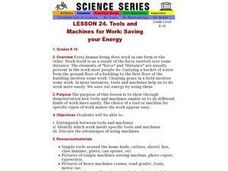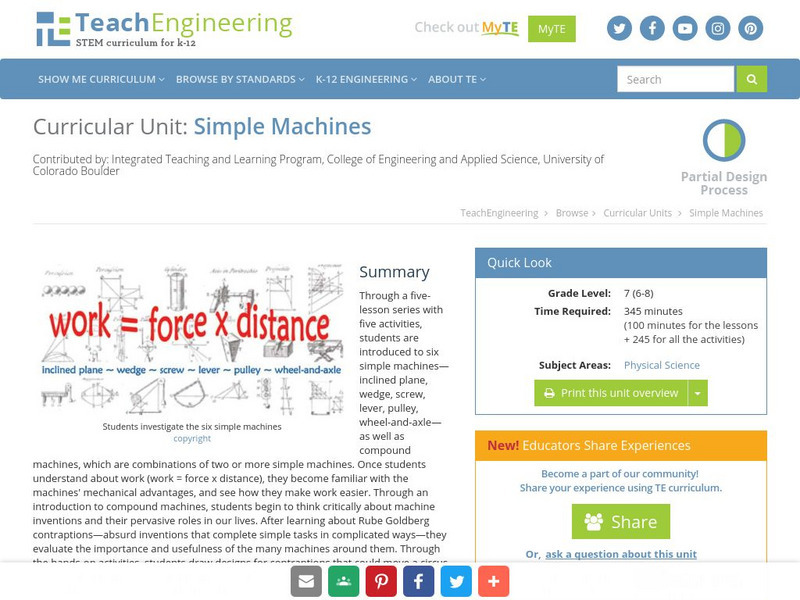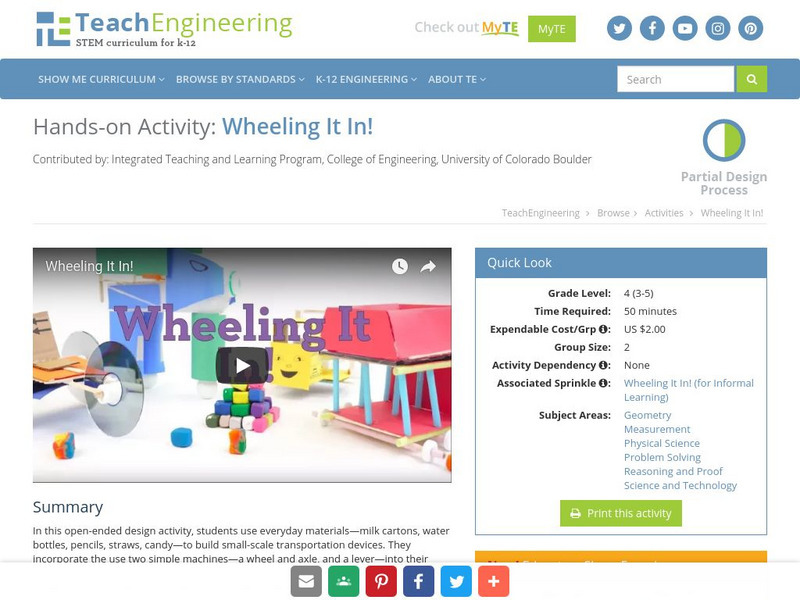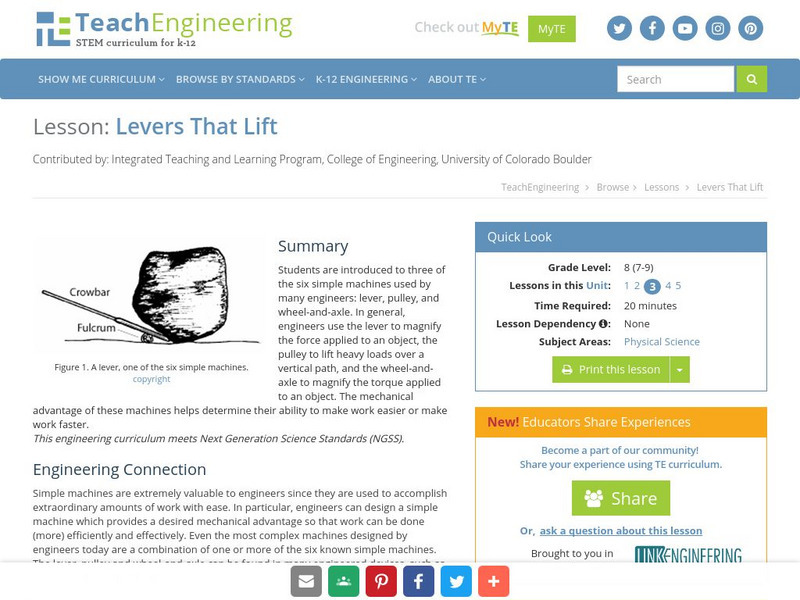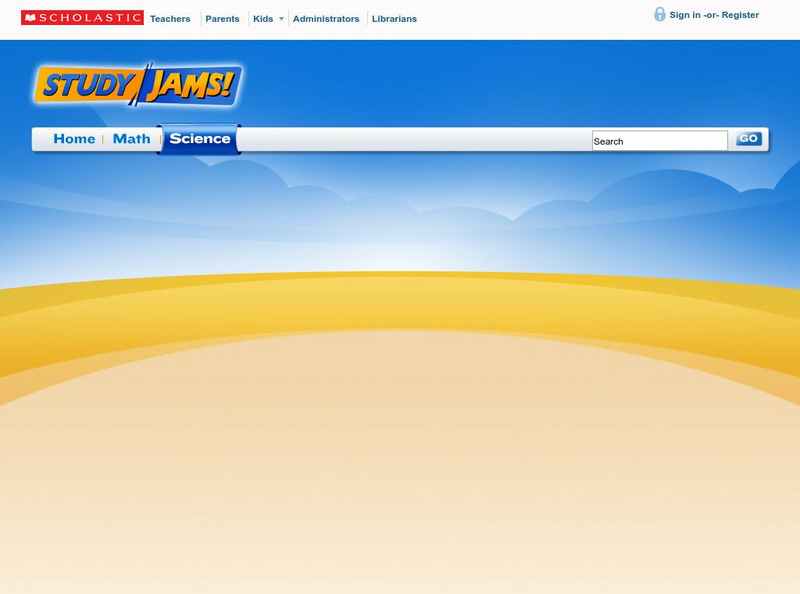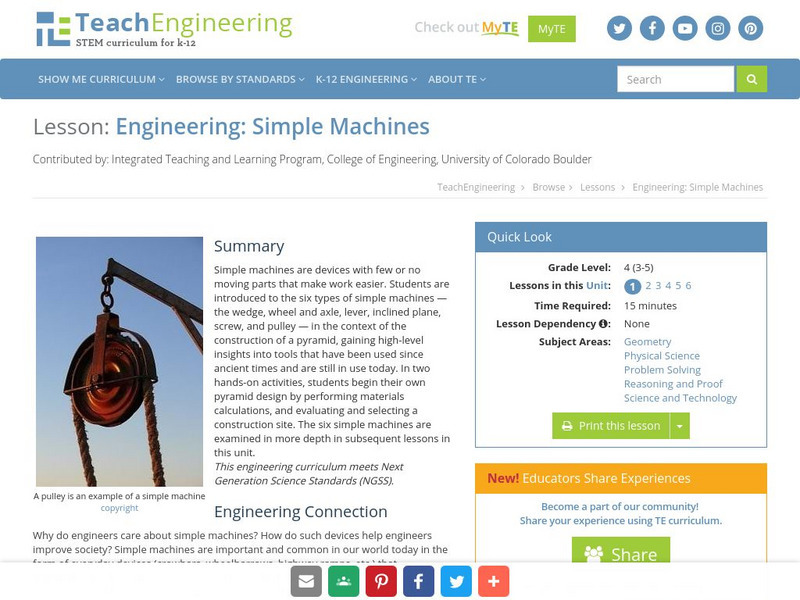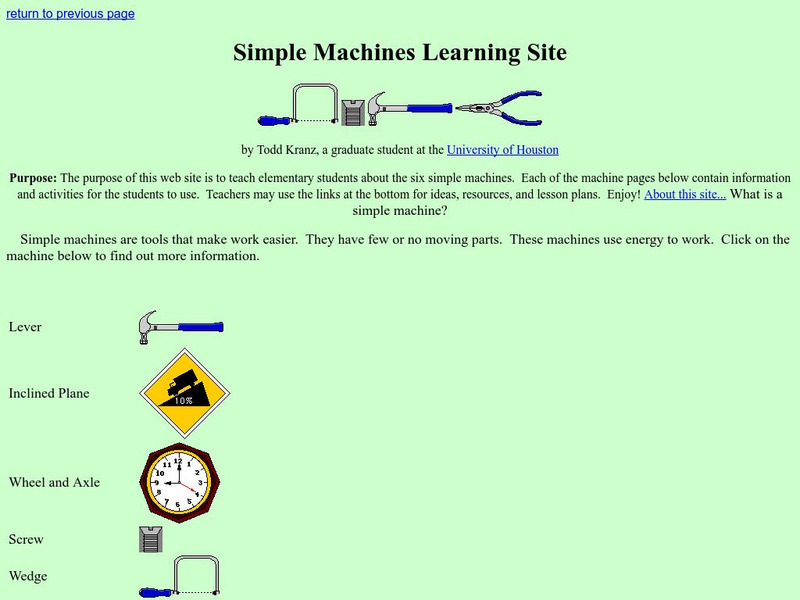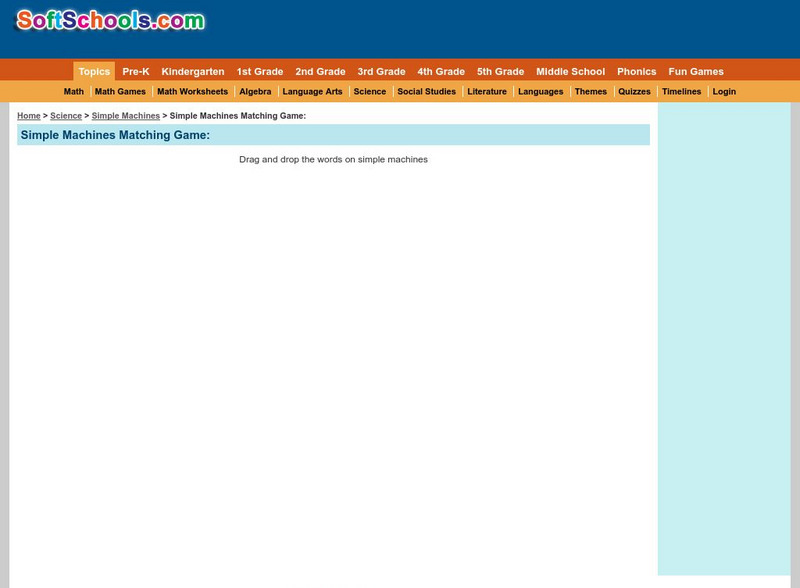Curated OER
Science-- "Moving the World?"- Learning About Levers
In this levers worksheet, students read a one page information text about the three classes of levers. Students then analyze 10 pictures of simple machines and circle the fulcrum point. Students classify each machine according to the...
Curated OER
QuickTime Science Project
Fifth graders divide into teams and select a simple science topic to explain and illustrate. They should pick a topic that they can illustrate with a very short (about 15-20 seconds) video clip, or QuickTime movie.
Museum of Science
Gadget Anatomy: Understanding Machines
Learners observe a machine closely from several angles while it operates. Identify the elements of machines combined in different gadgets. Create a clear diagram of how a machine works.
Curated OER
Tools and Machines for Work: Saving your Energy
Students consider how tools and machines can make work easier. They examine specific tools for making work easier.
Curated OER
What Can You Make of It?
Students investigate the various uses of a paper cup. In this scientific inquiry lesson, students investigate various ways to use a paper cup by identifying its characteristics. Students sketch their discovery.
Curated OER
Forces Applied to an Object
Fourth graders predict, observe, and compare what happens when a force is applied to an object. In this forces lesson, 4th graders complete a 'swinging hammer' activity to learn about forces and motion.
Scholastic
Scholastic: Dirtmeister's Science Reporters: Simple Machines: The Wheel and Axle
An in-depth explanation of the wheel and axle from Scholastic. Also provides several examples and a picture for understanding.
Science Struck
Science Struck: Simple Machine: All About the Wheel and Axle
Describes some history of the wheel and axle, how it works, the formula for calculating its mechanical advantage, and some applications of the wheel and axle.
TeachEngineering
Teach Engineering: Simple Machines
Through a five-lesson series with five hands-on activities, students are introduced to six simple machines - inclined plane, wedge, screw, lever, pulley, wheel-and-axle - as well as compound machines, which are combinations of two or...
TeachEngineering
Teach Engineering: Simple Machines From Pyramids to Skyscrapers
Simple machines are devices with few or no moving parts that make work easier, and which people have used to provide mechanical advantage for thousands of years. Students learn about the wedge, wheel and axle, lever, inclined plane,...
TeachEngineering
Teach Engineering: Wheeling It In!
In an open-ended design activity, students use everyday materials (milk cartons, water bottles, pencils, straws, candy) to build a small-scale transportation device. They incorporate the use of a wheel and axle, and lever into their...
PBS
The Math of Bicycles: Wheel Figure This Out (Grades 4 7)
Several good activities here. Look particularly at Wheel Figure It Out (which is the opening page) and Gearing Up. There are answers to the very good questions at the bottom of each.
SEDL
Southwest Educational Development Laboratory: Simple Machines [Pdf]
This large PDF file contains seven lessons on simple machines. Includes illustrations. Requires Adobe Reader.
TeachEngineering
Teach Engineering: Levers That Lift
This lesson introduces students to three of the six simple machines used by many engineers: the lever, the pulley, and the wheel-and-axle. In general, engineers use the lever to magnify the force applied to an object, the pulley to lift...
Integrated Publishing
Integrated Publishing: The Wheel & Axle
A solid chapter explanation of the wheel & axle simple machine. Examples, the basic math, explanation of mechanical advantage, drawings, solved problem. Use the Next button. There are four pages in this chapter.
Scholastic
Scholastic: Study Jams! Science: Force and Motion: Simple Machines
A slideshow and a short quiz on simple machines and how they reduce the amount of work or effort needed to complete a task.
TeachEngineering
Teach Engineering: Engineering: Simple Machines
Simple machines are devices with few or no moving parts that make work easier. Students are introduced to the six types of simple machines - the wedge, wheel and axle, lever, inclined plane, screw, and pulley - in the context of the...
TeachEngineering
Teach Engineering: Simple Machines and Modern Day Engineering Analogies
Students apply the mechanical advantages and problem-solving capabilities of six types of simple machines (wedge, wheel and axle, lever, inclined plane, screw, pulley) as they discuss modern structures in the spirit of the engineers and...
Alabama Learning Exchange
Alex: How to Make Something Simple, Hard
Middle schoolers will have completed a unit of forces and motion prior to the current unit of study on simple machines (lever, inclined plane, screw, wedge, pulley, wheel and axle). Students will review the functions and examples of...
Alabama Learning Exchange
Alex: Inventions Using Simple Machines Project
Students will have completed a unit on the six simple machines (lever, inclined plane, pulley, wedge, screw, and wheel and axle) before beginning this project. Students will choose to investigate an invention composed of one or more...
Other
University of Arkansas: Simple Machines
A thorough discussion of all the simple machines, beginning with some thoughts on mechanical advantage and conservation of energy. Very complete. Move down to the section that interests you.
University of Houston
University of Houston: Science Lessons: Simple Machines Learning Site
Provides definitions of all 6 simple machines with examples and student drawing of them. Interactive "simple machines quiz" at the end.
Soft Schools
Soft Schools: Simple Machines
Identify the six simple machines by dragging the correct term, and dropping it onto the associated simple machine.
Alabama Learning Exchange
Alex: Simple Machines
During this lesson, students learn about the six types of simple machines. They define each type of machine, experiment with each type, utilize the Internet to explore each type of machine and build their own simple machine. This lesson...





